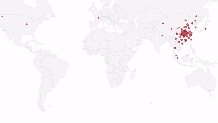Schools and universities are taking precautions and canceling international trips as concerns about novel coronavirus grow.
What to Know
- A new coronavirus was first detected in Wuhan City in China and has been detected in 50 locations internationally, including cases in the United States.
- On Jan. 30, the International Health Regulations Emergency Committee of the World Health Organization declared the outbreak a “public health emergency of international concern."
- There are 60 confirmed cases in the United States, including those repatriated from the Diamond Princess Cruise Ship. Officials said none are in Connecticut.
Those changes are being made out of an abundance of caution and in an effort to keep the school community safe.
“I was bummed for sure. It was something we were looking forward to for a long time,” said CCSU senior Sarah Willson.
Willson, who is an intern at NBC Connecticut, was among a group of students who learned their upcoming study abroad trip to Italy was being canceled because of coronavirus concerns.
“I understand the precautions they’re taking. I do. It was just hard to hear because we’re going to different parts where the virus was said not to have spread. But I do understand it’s growing so fast that it can change at any time,” Willson said.

The entire CSCU system is also making preparations including if classes on campus had to be canceled.
Local
It’s not just universities taking action amid concerns the virus could spread in this country.
“We don’t know what’s coming. So let’s get ahead of this,” said Dr. Joseph Olzacki, the Region 14 superintendent of schools.
Thursday Region 14 Schools starting to plan by bringing together health experts, emergency staff, as well as leaders of the two towns that make up the district: Bethlehem and Woodbury.
Right now staff keep schools clean and experts suggest everyone practice good health habits.
“We really have to respond at the local level and work together to protect our communities,” Neal Lutzig, the Pomperaug Health District Director said.
The Centers for Disease Control and Prevention has guidelines in place to help schools prepare for the possible spread of coronavirus.
All the state universities are working on a plan in case the dorms must be temporarily closed.
Frequently Asked Questions About Coronavirus
A novel coronavirus is a new coronavirus that has not been previously identified. The virus causing coronavirus disease 2019 (COVID-19), is not the same as the coronaviruses that commonly circulate among humans and cause mild illness, like the common cold.
Cases of Coronavirus in the United States
There have been 14 cases of this coronavirus -- COVID-19 -- in the United States. Twelve of them were travel-related and two were spread from person to person.
How Coronavirus Spreads
This virus was first detected in Wuhan City, Hubei Province, China. The first infections were linked to a live animal market, but the virus is now spreading from person-to-person.
The virus is thought to spread mainly from person to person, according to the CDC.
- Between people who are in close contact with one another (within about 6 feet)
- Via respiratory droplets produced when an infected person coughs or sneezes.
- These droplets can land in the mouths or noses of people who are nearby or possibly be inhaled into the lungs.
Spread from contact with infected surfaces or objects.
Symptoms of Coronavirus
- Fever
- Cough
- Shortness of breath
Note: The CDC believes that symptoms of COVID-19 might appear in as few as two days or as long as 14 days after exposure -- based on what has been seen previously as the incubation period of MERS-CoV viruses.
Prevention of Coronavirus
- Avoid close contact with people who are sick.
- Avoid touching your eyes, nose, and mouth.
- Stay home when you are sick.
- Cover your cough or sneeze with a tissue, then throw the tissue in the trash.
- Clean and disinfect frequently touched objects and surfaces using a regular household cleaning spray or wipe.
- Follow CDC’s recommendations for using a facemask. CDC does not recommend that people who are well wear a facemask to protect themselves from respiratory diseases, including COVID-19.
- Facemasks should be used by people who show symptoms of COVID-19 to help prevent the spread of the disease to others. The use of facemasks is also crucial for health workers and people who are taking care of someone in close settings (at home or in a health care facility).
- Wash your hands often with soap and water for at least 20 seconds, especially after going to the bathroom; before eating; and after blowing your nose, coughing, or sneezing. If soap and water are not readily available, use an alcohol-based hand sanitizer with at least 60% alcohol. Always wash hands with soap and water if hands are visibly dirty.
Information from the State on Coronavirus
The state has posted information online about Coronavirus Disease 2012 - COVID-19.



